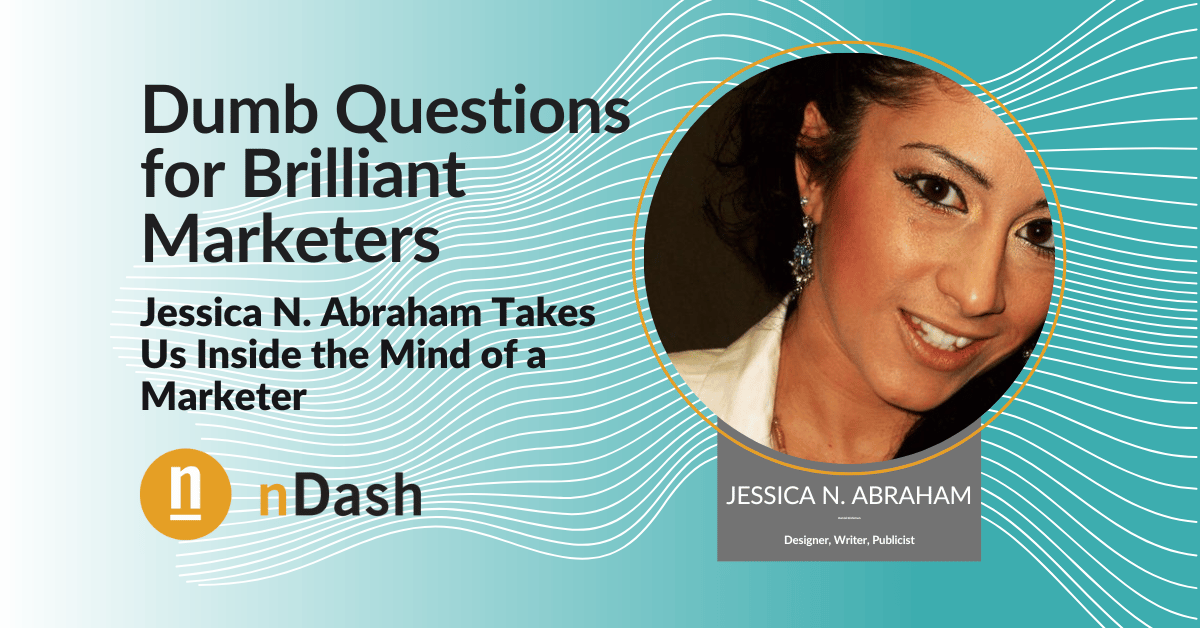We’re back with another interview in our Dumb Questions for Brilliant Marketers series. This time, nDash’s Managing Editor, Jenn Greenleaf, talks to marketer Jessica N. Abraham about all things freelance writing and marketing.
Jenn: Your background includes owning and being the director of marketing and public relations for Shorty Produkshins. Can you tell me about that experience and how it’s fueling your current career efforts as a marketer and writer?
 Jessica: I initially started this business in high school as a way to market my music. In my early years, I produced and engineered music, worked with artists, and built relationships with various labels. As I progressed through college, I began working with serious artists and producers, which solidified Shorty Produkshins as an official business.
Jessica: I initially started this business in high school as a way to market my music. In my early years, I produced and engineered music, worked with artists, and built relationships with various labels. As I progressed through college, I began working with serious artists and producers, which solidified Shorty Produkshins as an official business.
I was a young adult who started college at the age of 17 and didn’t have a lot of money to throw around recklessly. I worked in studios and an elementary school when I wasn’t attending classes. Plus, I lived off campus, and every penny I made went back into fueling my business — including building my own studio and investing in my artists.
As the company grew and my own reputation evolved for my own work, I started taking on projects beyond just “doing music.” That included things like designing websites and CD covers, promoting events, developing press kits, and writing artist biographies.
I ended up working with some notable individuals in the music industry, many of whom inspired me to focus more on the business side of things and take advantage of every opportunity that came in my direction — including working as a marketer and in public relations.
I found my true passions.
Alongside my work in the music and entertainment industry, I discovered my true passion was, in fact, writing and public relations. In high school, I had already been writing as a school correspondent for two city newspapers. And as I continued to explore writing opportunities, I treated it as a side hustle. I worked with platforms like Yahoo!’s Contributor Network and a few others that paid content creators early on. Later, I started working with more reputable companies, such as Benzinga, TalentZoo, TMC Net, and CBS Local, and my career outlook changed.
Shorty Produkshins continued to evolve, requiring us to market and promote ourselves as a business and a notable brand within our industry. I delved deep into search engine optimization (SEO), mastering it before it became mainstream. I had to find ways to outshine my competitors and gain visibility despite a highly saturated market and very limited budgets.
As a result, the company expanded its scope to include the corporate arena, working with doctors, emerging technology companies, entertainment industry professionals, athletes, publicly traded companies, and nonprofit organizations. Throughout this journey, my love for marketing, public relations (PR), and social branding strengthened, and over time, it became my only real passion.
Networking became a crucial aspect of my business, and I embraced the ever-evolving nature of my company. My adventurous spirit led me to new opportunities and connections, all of which propelled me forward.
Since then, I’ve been a major part of a few successful startups, even creating a very successful resume-writing agency that was never meant to be anything more than a training program.
My life has always paralleled that of Shorty Produkshins. I lived, slept, and ate my brand. In fact, you can even say we were one and the same. In 2019, I closed the doors to Shorty Produkshins, rebranding my journey under my name and fully focusing on who I am and what I offer to my audiences. This was when I decided to become a full-time writer, writing for some of the most prestigious companies in finance, business, and startup-related news.
Jenn: I see you also spent five years in radio as a co-host, engineer, producer, marketer, and public relations director. Can you tell me about that?
Jessica: I worked on a few different projects. One of them, The Sabir Bey Show, was created early on in the realm of streaming – before it was a “thing” to have your own show and before monetization was even really available.
Back then, Youtube was limited to only 10-minute clips, I believe. So our show was on several different platforms that allowed us to be on as long as we wanted. That allowed us to reach as many people as we could over varying geographic locations and levels of connectivity.
We had eight million weekly viewers from over 180 countries around the world. That was ultimately made possible thanks to the power of SEO and social branding. We had absolutely no budget. People were able to find us based on their niche interests or interests in the topics we discussed. It was about reaching people where they frequented most and allowing those people to find us in return.
I had to the be voice that resonated with them.
As the marketer and PR person, it was up to me to make sure they could find us and build the relationships that allowed us to reach new audiences. Essentially, I had to be a voice that resonated with them. Our show was controversial at the time, and while people regularly watched, shared our content, and even called in live, they weren’t always so public about it. Many viewers were “scared” to subscribe or follow our brand on social media due to our content and subject matter.
We relied on analytics to tell us their story in order to promote our work and continue creating content for them. Yes, it was a challenge… but I’m one who loves obstacles. And we quickly got over them. Social branding was also a major part of this, and I will always advocate social branding as a necessary tool in everything we do.
Our content was critical in keeping viewers educated and engaged and in driving brand awareness. If we wanted to introduce them to new content, we needed to keep them interested in our existing material.
We had to be diligent, show our references, backlink when possible, bring in subject matter experts in both the written and viewable media and so much more. Hence, we were very dependent on reporting and analytics tools to tell our actual numbers to grow new and repeat traffic, page views, backlinks, etc.
Jenn: What role did content creation play in your experiences as a marketer?
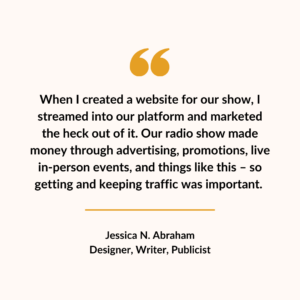 Jessica: Content creation is always going to be significant when shaping the experiences of our audiences. It’s 2023, and content is still king. It’s the most organic way to drive and convert traffic when calling an audience to action.
Jessica: Content creation is always going to be significant when shaping the experiences of our audiences. It’s 2023, and content is still king. It’s the most organic way to drive and convert traffic when calling an audience to action.
In addition to this show, I worked for three years on a terrestrial FM radio show that garnered a 28-share market (28% of all FM listening audiences in the listening area) during our one-hour weekly show.
We were on six FM stations and one AM station, which included 18 major cities in Florida, a broadcast in the Bahamas, and a broadcast in Baton Rouge. It was an FM station, and their presence was lacking. They didn’t even have social media. But, they did have an online stream on their website and streamed to platforms like TuneIn and iHeartRadio.
We took advantage of this.
When I created a website for our show, I streamed into our platform and marketed the heck out of it. Again, there was no budget. But, our radio show ended up making money through advertising, promotions, live in-person events, and things like this – but getting and keeping traffic would always be important. We implemented things the listener would like to hear and know.
We learned a lot of our listeners were independent artists. So, we brought in industry executives who’ve worked on major projects. We brought in lawyers to explain the business. Then, we brought in brands outside of the industry to discuss success in business.
We brought in legendary artists and even did the 20th-anniversary show for some of them. Then, we spotlighted independent artists — and took that to our social media platforms, associated news outlets, etc.
Because of this, we quickly built up online listenership on a SATURDAY NIGHT to over 300,000 (on an average night) globally. We had people as far away as Australia and Hawaii calling in live to this little tiny radio station in Fort Pierce, Florida. That’s the power of content, SEO, PR, and social branding — and that 300,000 wasn’t including our replayed shows or the live FM listening audience!
Jenn: How does this play into the power of SEO?
Jessica: When creating content, you should always be thinking about SEO:
- What you want to say
- What you want to be known for
- Know what people are looking for
- What they’ll want to know about the topic they’re looking for and all the relative details
- What they’re going to do next
- How to bring them back for more
You want to keep them engaged with your content and return to it regularly. And more importantly, you want to build new audiences and niches by expanding your reach organically. SEO will be the ultimate weapon in seeing your brand and content prosper.
People know what they want to see, but how will you get them there? And with retargeting methods, how will you ensure that your content is the content they will continue to see time and time again?
Jenn: How do you explain the difference between a marketer and a publicist?
Jessica: PR is a highly personal and relationship-driven field. It involves reaching out to individuals on a one-on-one basis and building real connections, like contacting writers, editors, and platforms to pitch articles or inviting them to events.
It’s building meaningful relationships, developing partnerships, and leveraging those connections to mutually gain visibility and coverage for a project or brand. It requires proactive communication and personalized outreach to create — and especially give — ongoing opportunities for exposure.
Being a marketer encompasses broader strategies aimed at brand awareness and conversion. While marketing may involve reaching out to various platforms or audiences, it isn’t always centered around building personal relationships.
Marketing efforts often focus on increasing brand visibility, engaging with target audiences, and optimizing conversion rates. It involves advertising, social media campaigns, content creation, and analytics to track performance that drives individual interest in a brand over time.
Social branding, as I see it, bridges the gap between PR and marketing. It allows for the cultivation of relationships while simultaneously building brand awareness. To me, social branding is everything. It involves connecting with the target audience on a deeper level, building a loyal following, and creating an authentic brand identity. It goes beyond mere exposure and creates strong connections between the brand and its audience.
These three aspects play distinct roles in promoting and growing a brand or project. I try to incorporate these aspects into everything that I do.
Jenn: Do you have a team of writers, or do you find that you have to do most of the writing yourself when you’re working on various projects?
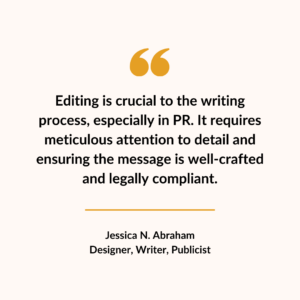 Jessica: So, it depends on the nature of the writing project and the resources available.
Jessica: So, it depends on the nature of the writing project and the resources available.
When I work with a team of writers, we engage in a collaborative process. We come up with strategies together and discuss the topics that need to be covered.
Even within a team, though, there’s often a level of independent work involved. Sometimes I find myself up at 3 a.m., writing several pages to meet deadlines, do some serious research, and ensure the content’s quality.
When I work with freelance writers to outsource certain tasks, it’s similar to working with clients. I provide them with guidance and instructions, and then I take on the role of editing and refining the content. Editing is crucial to the writing process, especially in PR. It requires meticulous attention to detail and ensuring the message is well-crafted and legally compliant.
In particular industries, such as cannabis, clean energy, finance, and fintech, specific regulations and keyword usage must be addressed accurately. Some of them require additional labels and disclosures for transparency purposes. I take extra care to use the correct terminology and ensure legal and industry compliance. Building relationships with reliable freelance writers and outsourcing certain writing tasks has been an effective approach for me. It allows me to leverage the expertise of others while maintaining control over the final content.
As a side note, I strongly believe in quality over quantity. For a business to succeed long-term, especially when competing with artificial intelligence, you better bring your “A” game by focusing on your content’s quality and leave quantity-writing to content mills that just push out projects to fulfill a quota.
Jenn: As a marketer, what key elements do you look for in a writing portfolio when outsourcing to freelance writers?
Jessica: While experience in regulated and compliance-oriented realms is valuable, I’ve also encountered great writers without prior experience in those areas. It truly comes down to their writing quality and ability to tell a compelling story.
Personality in writing:
One important aspect is the presence of personality in their writing. It’s crucial that the content feels like it’s coming from a real person, as this helps engage the audience. I pay attention to whether they effectively explain complex concepts.
For example, suppose they’re discussing something like CBDC (Central Bank Digital Currency). In that case, they must provide clear explanations that cater to readers unfamiliar with the topic — even if that means going into detail to explain the ins and outs of that particular topic or pointing them in the direction of more information related to that topic. You can’t just assume the reader knows what something is or what it means based on how popular that topic is or has been within the media.
Reading level:
Another key consideration is the “reading level” of their writing. Aiming for a ninth to eleventh-grade reading level is often considered optimal. That way, the content is accessible to a wide range of readers. It also leads to a smoother and much more enjoyable reading experience, with readers more likely to follow along, subscribe, and engage with the content.
Professionalism:
Besides the quality of writing, I assess the writer’s professionalism and how they showcase their work. I look for evidence of their articles being shared across social media and whether they consistently hit on the relevant keywords and key phrases related to their work.
SEO knowledge:
Understanding the importance of SEO in the writing process is crucial. Adopting the best practices for search engine optimization without resorting to keyword stuffing can really propel the reach and visibility of just about any blog, article, or whitepaper. Balancing storytelling with the inclusion of relevant details is a skill I greatly appreciate in freelance writers.
Again, it’s all about the content – quality over quantity. And a well-researched piece can make your work really stand out among all others. SEO just helps them find it.
Jenn: As a marketer, what’s your take on AI in the creative industry?
Jessica: I find it an excellent tool for some creators but not for others. For example, if you’re a graphic designer or film director, I can see it as something inspirational. For writers, I can see it as a great tool for prompting ideas, battling writer’s block, and accelerating the planning process. But, I don’t see it as something we should become dependent on, as it can thwart the creative process, and our work becomes anything but our own.
Let me explain this in more detail, but first – the bad (from a number of standpoints):
For musicians:
I don’t think it’s good for musicians. We can literally create new music from artists that have passed on and steal their likeness in collaboration with new artists — and eventually, artists that don’t even exist. The same with producers. I feel like one day, we’ll see “viral videos” created in AI and music videos that don’t feature one real person.
And because this world is based so much on “beauty” and materialism, I believe we’ll start seeing a very unrealistic view of how people should look and what they should do… On a positive note, this could lead us to appreciate natural beauty and begin to despise materialism – but in reality, this outcome will likely be the opposite.
For photographers:
Photographers will put out their best work ever with amazing filters and effects. Graphic designers will be able to do things they’ve never done before. They won’t need real models, yet real models may find their work picks up. They’ll be inspired and able to tackle their own obstacles with more complex and visually appealing pieces. They can be more imaginative and creative in what they do. Their work will be more flawless.
For writers:
Writers will find they can create a visual that speaks a million words, telling their entire story in one image. They can do this without using the same stock image a gazillion other people have already used. This can also fool readers into thinking they’ve already read an article when they, in fact, haven’t. Stories will be more engaging, and we’ll likely see the integration of more interactive media when it comes to articles and writing.
For transcribers:
I do want to point out I do love AI for transcribing interviews and editing original content. It’s important to understand, however, that they do make suggestions that aren’t always accurate. There’s still a need to understand the mechanics of writing to determine whether what’s being presented to you is correct.
Also, having strong attention to detail is a must — in my experience as a writer and a marketer, a transcription will sometimes make mistakes. Especially when it comes to proper names and spelling. So, do your due diligence.
Jenn: Do you believe AI has caused disruption or other challenges within your teams?
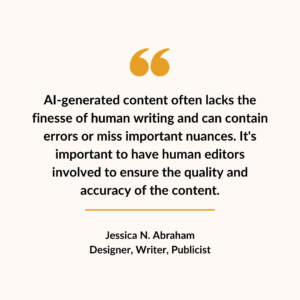 Jessica: Yes, definitely. Let me share a personal story:
Jessica: Yes, definitely. Let me share a personal story:
I worked with a company where I had written as the Lead Blogger for quite some time. My articles were performing well, and I had established a strong presence on their website, with most of my work surpassing a decade’s worth of articles from tenured writers. However, the company decided to introduce AI-generated articles as a cost-saving measure that replaced all of the company’s writers.
This was 2016, and the writing industry saw massive layoffs at some of the largest news and magazine outlets across the United States.
We were informed that they were fully transitioning to AI within a week, and we were all simply let go. All the writers, except those writing for free, were replaced by AI – and eventually, the company’s website was no longer accessible. It was actually taken over by the AI over a period of time!
Jenn: Do you think the quality of the site’s content suffered?
Jessica: The quality of the content generated by AI was noticeably different. It lacked the depth and personality that human writers bring to their work. As a writer and a marketer, I could tell the articles were generated by algorithms and lacked the human touch that naturally engages the readers.
There were also instances where the AI-generated content contained false information or was overly generic and cliché. This compromised the credibility and quality of the company’s content. Because I still had access to the platform’s metrics, I could see that the articles were ranked much lower and that there were far fewer shares of those articles across social media.
Another interesting thing… I’ve recently encountered AI bots used for resume writing. While they may optimize resumes for applicant tracking systems (ATS) and tailor them to specific job descriptions, they often fail to capture the candidate’s personality and unique characteristics. Human resume writers can go beyond the cause-and-effect format and create resumes representing the candidate’s skills and experiences.
The use of AI bots in this area may diminish the quality of resumes and impact the cost of professional resume writing services. Especially in the case where artificial intelligence and machine learning, used by companies like PeopleKeys, are analyzing resumes for DISC-based personalities and workforce optimization.
While AI can be beneficial in certain areas, like energy grid management or generating headline ideas, it falls short when it comes to writing and editing. AI-generated content often lacks the finesse of human writing and can contain errors or miss important nuances. It’s important for a marketer or agency to have human editors involved to ensure the quality and accuracy of the content.
I have personally experimented with AI tools and found that they sometimes produce false information, even when given specific instructions or URLs to work with. This can be problematic in a time when misinformation is already prevalent, and people may unknowingly share inaccurate content generated by AI.
Jenn: You mentioned that AI might be a good tool for generating headlines. As a marketer, what do you think about using it when generating outlines?
Jessica: Yes, it could be good. It can provide a structure and help streamline the process. But, adding that human touch and personalization to the outlines is important. When telling a story, a document should be ever-evolving. AI may be able to provide a basic framework, but it lacks the understanding of what readers are truly looking for and the ability to capture their attention.
A marketer must consider the audience’s perspective regarding outlines. How can we present information quickly that delivers what they need? While AI-generated outlines may be helpful as a starting point, I believe it’s still necessary for human writers to fine-tune and add the necessary personality and insights. This ensures that the outlines effectively convey the message with accuracy while aligning with the brand’s voice.
Relying solely on AI-generated outlines may lead to a lack of diversity and originality in content creation. If everyone uses the same AI-generated outlines, especially when trying to beat SEO, important aspects and unique perspectives may be overlooked. It’s important to strike a balance and use AI as a tool to enhance our writing skills rather than becoming solely dependent on it.
The irony here is that Google has outright stated that for the new helpful content algorithm, AI-written content would be penalized. At the same time, Google gives consideration and even encourages the use of AI as a tool when developing outlines and written content.
When it comes to headlines, I’ve seen first-hand where a platform will use AI to determine whether it sounds “clickbaity” or not. Essentially those platforms want to preserve the quality and reputation of their websites, especially when understaffed with editors. I’ve seen great headlines killed because they didn’t meet the anti-clickbait criteria.
Jenn: With the flood of AI content in search engine results, do you feel like there’s more pressure on a marketer or writer to interview subject matter experts or other people to fuel the writing and prove that it’s like a human that has human touch?
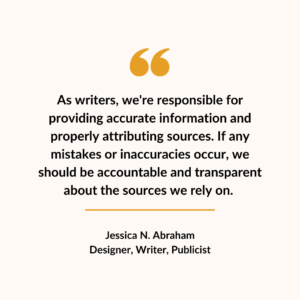 Jessica: I feel like that should be a pressure anyway.
Jessica: I feel like that should be a pressure anyway.
Writers need to showcase thorough research and demonstrate that the information being presented isn’t simply regurgitated from corporate sources or AI-generated content. As a writer, I strive to produce valuable insights and unique perspectives that come from engaging with real experts in the field. We have a responsibility to our clients and a responsibility to the media. This is one way to gain authority through our content. And it’s not really hard to do.
Platforms like HARO (Help a Reporter Out) and Twitter’s #journorequest play a crucial role in connecting writers with subject matter experts. These platforms help us find the right sources and bring their expertise into our content, ensuring we provide accurate and reliable information. By incorporating the voices of experts, we not only enhance the credibility of our work but also offer readers valuable insights they can trust.
Again, useful AI transcription tools, like Otter, can help a writer and marketer with the interview process. These tools can assist in transcribing those interviews and even generating outlines based on those interviews. But they should only be used as a supportive tool rather than a replacement for genuine human expertise and interaction.
As writers, we’re responsible for providing accurate information and attributing our sources. If mistakes or inaccuracies occur, we should be accountable and transparent about the sources we rely on. By doing so, we maintain our integrity and ensure readers understand that we’re sharing information based on what we believed were credible sources when engaged in thorough research.
Jenn: As a marketer and publicist, what’s your process for vetting sources?
Jessica: My process involves thoroughly researching and carefully evaluating sources. I start by looking at the background and reputation of the source. Then, I consider factors such as whether they are listed on the stock exchange or if they have made significant contributions to our society through research or other impactful work. I also consider how their peers view them and how the general public perceives them.
It’s important to note that being on the stock exchange or having a positive reputation doesn’t automatically guarantee credibility. There have been cases where even seemingly credible sources turned out to be involved in fraudulent activities or unethical practices. As a marketer, I prioritize ethics and integrity when selecting sources. And I avoid individuals or organizations with questionable behavior, even if they may have a high level of credibility within their industry.
As a marketer, another aspect I consider is the consistency and reliability of the information they provide. I look for sources with a track record of accuracy and responsible reporting. I pay attention to whether they cite their own sources, use reputable references, and adhere to journalistic standards.
With PR, I’ve encountered situations where unethical practices were employed to manipulate public perception. This includes creating fake message board posts or using internal people to pretend to be external voices. I firmly believe in ethical conduct and refuse to be part of such practices. As members of the media with the ability to sway public opinion, we need to realize that our actions can have dire consequences and that sometimes what may be a paycheck to us can seriously impact another person’s entire life.
Jenn: What advice do you have for those interested in working as a marketer or writer?
Jessica: It’s important for a marketer and writer to stay vigilant and aware that some fraudulent activities or unethical behavior may not come to light until years later. That’s why I remain cautious and strive to ensure the credibility and integrity of the sources I choose to rely on.
For this, I strongly urge new writers to do some soul-searching. Learn what you’re most passionate about and the topics that you’re the most curious. They’ll tell you to pick a niche. But I almost feel like if you want to resonate with new audiences, you’re going to want to grow with them.
Sure, you’re going to write about the same things — but do you want to write about the same things everyone else is writing about? What’s going to send you down that rabbit hole? This is what’s going to keep your audiences engaged and coming back for more. It’s what’s going to send them down that same rabbit hole. They want to learn and be entertained, but they want it to come from a trusted source.
Do that research. Be interesting. And keep appealing to your audiences time and time again.
Don’t be afraid to cast out further every time you write. Try new things. What keeps tapping at the keys at three in the morning is the same thing that keeps them referencing your work before eventually sharing it with everyone they know.
Become that authority. When working as a writer — or even a marketer — realize that you’re also a brand. While you may rely on others to tell your story, make other writers go to you for vetting. Become the source and let them come to you for the truth and understanding. Be the source that other writers reference in their writing.
About Jessica N. Abraham
 Jessica N. Abraham, a marketer, writer, designer, and publicist, has dedicated nearly two decades to social branding, public relations, and digital marketing strategy. Specializing in business, technology, and the jobs industry, her writings delve into corporate affairs, connected technologies, electrification, team-building, and globalization.
Jessica N. Abraham, a marketer, writer, designer, and publicist, has dedicated nearly two decades to social branding, public relations, and digital marketing strategy. Specializing in business, technology, and the jobs industry, her writings delve into corporate affairs, connected technologies, electrification, team-building, and globalization.
She has written for numerous platforms, including Benzinga, NewsBreak, The Muse, CBS Local, Yahoo! Contributor, and more. Her work is featured on Yahoo! Finance, TD Ameritrade, Business Insider, MSN Money, and the Stansberry Terminal, among others. Her commitment to her craft has established her as a prolific contributor to the global discourse in her field. Click here to learn more: Jessica N. Abraham.
